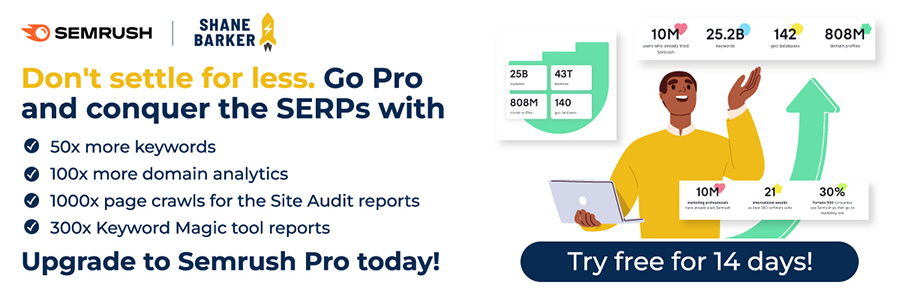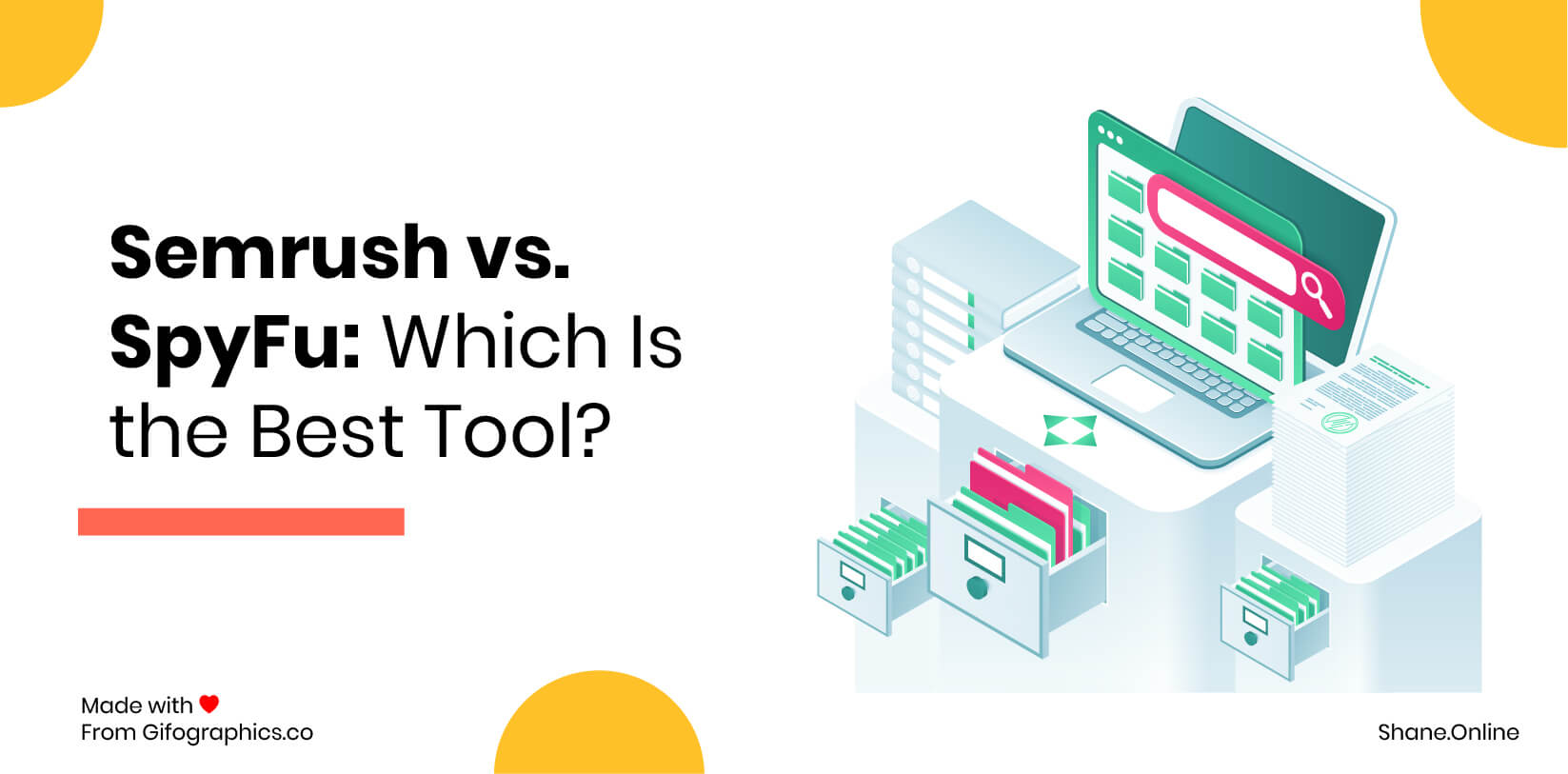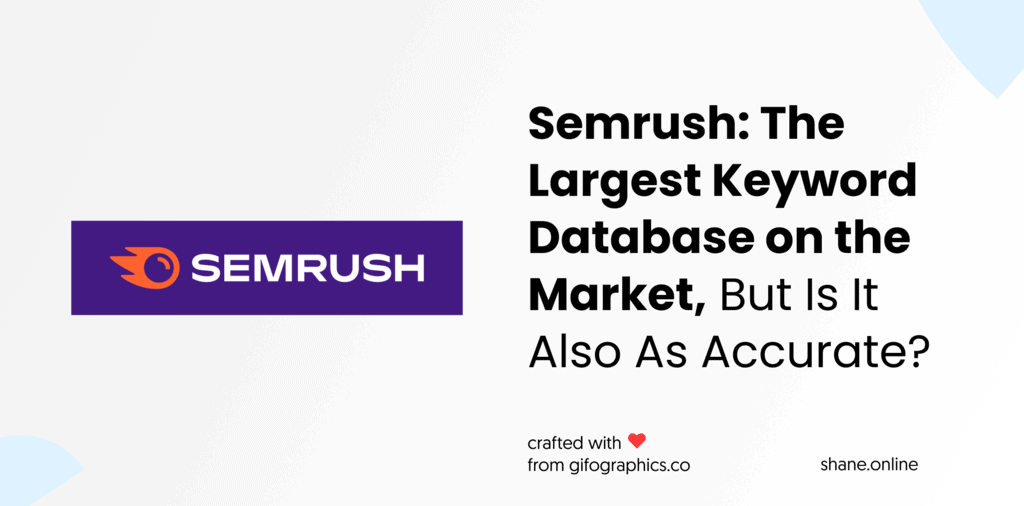Having been working in digital marketing for over 2 decades, I often come across conversations related to the best SEO platforms. Two such platforms are Similarweb and Semrush. In this article, I’ll pit the two SEO platforms against each other, Semrush vs. Similarweb.
I’ll test and compare both platforms, do an in-depth analysis of each’s tools, and compare their subscriptions and support.
![semrush vs. similarweb ([year]): which is the better seo tool? 1 shane barker semrush vs. similarweb](https://shanebarker.com/wp-content/uploads/2023/03/shane-barker-semrush-vs-similarweb_1.png)
Table of Contents
What is Semrush?
Semrush is a powerful SEO tool that offers in-depth analysis of websites and helps businesses with their search engine optimization efforts.
It provides detailed insights into competitor analysis, keyword research, backlinks, organic traffic, and more. With Semrush, companies can easily track their progress and make informed decisions to improve their online presence and drive more traffic to their website.
The user-friendly interface and customizable reports make it an ideal choice for small and large businesses alike.
Curious to know all the ins and outs of Semrush. Read my review of Semrush for an in-depth look at everything on offer.
What is Similarweb?
SimilarWeb is a website analytics platform that provides insights on website traffic, demographics, and audience engagement.
It offers valuable information for businesses, marketers, and online marketers to make informed decisions and improve their online presence. With its user-friendly interface, businesses can easily track their competitors, monitor market trends, and optimize their digital marketing strategies.
In addition to website analytics, SimilarWeb also offers a suite of digital market intelligence tools, including mobile app market data and mobile app store optimization.
This allows businesses to not only track their website's performance but also gain insights into the mobile app market and how to improve their app's visibility in app stores.
SimilarWeb's data is sourced from a variety of sources including website cookies, on-device data, and direct measurement from websites and apps, ensuring the accuracy and reliability of its insights.
Overall, SimilarWeb is a powerful tool for businesses looking to improve their online visibility and drive more traffic to their website.
If you want to know all the nitty-gritty details of Similarweb, you’ll find those in my full Similarweb review.
Comparison Table of Semrush vs Similarweb
Features | Semrush | Similarweb |
Supported search engines | Was built around using Google’s Search Engine | Gets data from all search engines |
Keyword database size | 21.1 billion | Similarweb does not offer an exact number but boasts an updated Keywords 2.0 which makes use of a hybrid of public data sets, as well as data from a contributory network. |
Content marketing platform | Semrush has this feature under their AI called ImpactHero. | There is no dedicated content marketing platform |
Mobile rank tracking | Semrush offers tracking of SERPs on mobile devices. | Similarweb does offer mobile insights as well |
Outbound link analysis | You can, but it is more difficult since it is not a dedicated feature. | Similarweb does have an outgoing traffic analytics tool |
On-Page SEO checker | There is a dedicated on-page SEO checker | There are no on-page SEO checker tools |
SEO content template | There is a dedicated SEO content template tool to create briefs easily | Similarweb does not have an SEO content template |
Website audit | An in-depth website auditing tool | Although offering plenty of insights, there is no dedicated auditing tool |
Backlink audit | It has a backlink auditing tool | There is no backlink audit tool |
Social Media Toolkit | Semrush does have tools that provide insights into social media | Similarweb does provide some social media tools and analytics |
PPC Keyword Tool | This tool focuses on commercial keywords, to help you build PPC campaigns | There is no dedicated PPC keyword tool, but Similarweb allows you to filter keywords to paid-per-click keywords |
Local SEO | Semrush offers an excellent Local SEO platform that measures your SEO score against local competitors, as well as offers keywords to use to beat local competition | There is no local SEO tools available |
Market/Trends Explorer | Semrush’s Trends offers insights into the marketplace, with traffic analytics, including audience behavior and insights, as well as statistics of your competitor’s market share | Similarweb does provide marketing insights through its market channels tool set |
Free trial | Has a 14-day free trial | Has a 7-day free trial |
Semrush VS Similarweb Detailed Features Comparison
Now that I’ve shown you a quick overview of the tools you find in both Semrush and Similarweb, let’s delve deeper into a detailed comparison of the key features of each.
Semrush vs SimilarWeb: Keyword Analysis
The main tools and dashboards for keyword research that Semrush offers are:
In this dashboard, you can get a detailed report on any particular keyword, including all relevant keyword data and keyword analysis. You can see metrics like volume, global volume, SERP features, keyword variations, etc.
![semrush vs. similarweb ([year]): which is the better seo tool? 2 semrush keyword overview](https://shanebarker.com/wp-content/uploads/2021/05/Keyword-Overview.png)
The keyword magic tool is the main keyword research tool that Semrush offers. You can find broad match, exact match, and phrase match keywords for paid search ads or simply get a list of all related keywords for SEO.
![semrush vs. similarweb ([year]): which is the better seo tool? 3 semrush keyword magic tool](https://shanebarker.com/wp-content/uploads/2021/09/semrush-keyword-magic-tool.png)
In contrast, Similarweb has a powerful keyword research tool that you can use to find target keywords and sort them based on parameters like volume, competitiveness, etc. You can also use it to monitor the search traffic data and trends in your niche.
![semrush vs. similarweb ([year]): which is the better seo tool? 4 similarweb keywords tool](https://shanebarker.com/wp-content/uploads/2023/03/similarweb-keywords-tool.png)
It’s much less complicated than Semrush, offering you the most valuable information on one simple dashboard.
The Similarweb Keyword tool has plenty of filters to narrow down your keyword research including search engine, paid/organic search, branded or non-branded, keyword intent, and even SERP features.
![semrush vs. similarweb ([year]): which is the better seo tool? 5 similarweb keyword tool filters](https://shanebarker.com/wp-content/uploads/2023/03/keyword-tool-filters.png)
The Keyword Phrase tool shows all keywords used on a site and displays their percentage of search traffic sent to the website. It’s a great way to quickly identify high and low-performing keywords.
![semrush vs. similarweb ([year]): which is the better seo tool? 6 similarweb keyword phrases](https://shanebarker.com/wp-content/uploads/2023/03/similarweb-keyword-phrases.png)
Overall winner: Similarweb
It might come as a surprise, but the overall ease of use, combined with an in-depth, customizable filter, Similarweb makes researching keyword performance and finding new keywords easy and simple.
Semrush vs SimilarWeb: Social Media Analysis
Semrush has a social media toolkit that consists of a
- Social Poster
- Social Tracker
- Social Analytics
- Social Inbox
- Influencer Analytics
![semrush vs. similarweb ([year]): which is the better seo tool? 7 semrush social media tools](https://shanebarker.com/wp-content/uploads/2023/03/semrush-social-media-tools.png)
One highlight of their social media toolkit is the social media tracker.
It quickly offers an overview of all connected social accounts and their performance. It can also provide insights on the number of website visits to come from each social media account.
![semrush vs. similarweb ([year]): which is the better seo tool? 8 semrush social media tracker](https://shanebarker.com/wp-content/uploads/2023/03/semrush-social-media-tracker.png)
Semrush also acts as a social media content planner, allowing you to create posts, and schedule them. Semrush’s social media inbox will then connect all messages and comments together in one convenient inbox.
![semrush vs. similarweb ([year]): which is the better seo tool? 9 semrush social media poster](https://shanebarker.com/wp-content/uploads/2023/03/semrush-social-media-poster.png)
Similarweb has a social media analytics tool, but that’s about where it ends.
It’s a great way to find out how well your social media accounts are doing, and how many visitors to your website come from each social media account, but that is all it has to offer.
![semrush vs. similarweb ([year]): which is the better seo tool? 10 similarweb social media tracker](https://shanebarker.com/wp-content/uploads/2023/03/similarweb-social-media-tracker.png)
The social media overview dashboard looks great, and is easy to use, but lacks any extra features that Semrush offers like a social media inbox, and content scheduler.
![semrush vs. similarweb ([year]): which is the better seo tool? 11 similarweb competitor research](https://shanebarker.com/wp-content/uploads/2023/03/similarweb-competitor-research.png)
Overall winner: Semrush
Semrush doesn’t just offer social analytics, but allows you to run all your social media accounts from the Semrush platform itself, essentially acting as a content marketing tool.
Semrush vs SimilarWeb: Competitor Analysis
Semrush’s competitive research is split into
![semrush vs. similarweb ([year]): which is the better seo tool? 12 semrush competitor research](https://shanebarker.com/wp-content/uploads/2023/02/semrush-competitor-research.jpg)
The Keyword Gap tool is an extremely useful tool that can be found on both Semrush and Similarweb.
Both Keyword Gap Tools offer similar analytics, allowing you to compare keywords from your competitors, how well they’re ranking, and keywords you might be losing out on.
![semrush vs. similarweb ([year]): which is the better seo tool? 13 semrush competitor research in-depth](https://shanebarker.com/wp-content/uploads/2023/03/semrush-competitor-research-in-depth.png)
Semrush Keyword Gap Tool
![semrush vs. similarweb ([year]): which is the better seo tool? 14 similarweb keyword gap](https://shanebarker.com/wp-content/uploads/2023/03/similarweb-keyword-gap.png)
Similarweb Keyword Gap Tool
Both bring up a keyword overlap graph, and offer weak keywords that aren’t ranking well against your competitors.
Semrush offers a list of keywords, with their volume, KD, and CPC of competitors versus your website, allowing you to quickly gauge how your keywords are performing against them.
![semrush vs. similarweb ([year]): which is the better seo tool? 15 semrush keyword gap tool 4](https://shanebarker.com/wp-content/uploads/2023/03/semrush-keyword-gap-tool-4.png)
Just like Semrush, Similarweb also has some competitor analysis and benchmarking features. It allows you to benchmark your traffic data with competitors across various channels.
Simply go to “similar sites” and you’ll find competitors with some basic analysis already.
![semrush vs. similarweb ([year]): which is the better seo tool? 16 similarweb similar sites](https://shanebarker.com/wp-content/uploads/2023/03/similarweb-similar-sites.png)
You can also use this to study your competitors’ strategies and identify things that you can incorporate into your SEO or content strategy by clicking on a competitor.
![semrush vs. similarweb ([year]): which is the better seo tool? 17 similarweb similar sites in-depth](https://shanebarker.com/wp-content/uploads/2023/03/similarweb-similar-sites-in-depth.png)
One tool I really like is the competitive tracker tool, which offers you quick insights to your website, versus up to 25 competitors. It shows how well you’re performing in different areas vs all these competitors, with a quick summary for each.
![semrush vs. similarweb ([year]): which is the better seo tool? 18 similarweb competitve trackers](https://shanebarker.com/wp-content/uploads/2023/03/similarweb-competitve-trackers.png)
Similarweb’s Keyword Gap Tool is on par with Semrush’s and offers almost exactly the same results.
Overall winner: Semrush
Broadly speaking, Similarweb offers a breadth of competitive analysis tools that may look the same as Semrush. However, when I used both platforms, I felt that Semrush was in this instance much easier to use and navigate.
Some of the features from Similarweb like the Keyword Gap Tool aren’t actually listed under competitor research, but under acquisition channels, which was confusing, but makes sense in that Similarweb isn’t as SEO-focused, but more focused on competitive research.
Semrush vs SimilarWeb: Traffic Analysis Tool
You can use Semrush traffic analytics to get in-depth traffic data for your website and even compare it with your top competitors.
Audience insights, traffic journey, geo-distribution, subdomains, top pages, and bulk analysis are some notable insights that you can get under various tabs in Semrush traffic analytics.
![semrush vs. similarweb ([year]): which is the better seo tool? 19 semrush traffic analytics](https://shanebarker.com/wp-content/uploads/2023/03/semrush-traffic-analytics.png)
You’ll also get some more insights such as traffic by source, traffic by countries, as well as filtering these insights according to set parameters like date, and bounce rate.
![semrush vs. similarweb ([year]): which is the better seo tool? 20 semrush traffic analytics 2](https://shanebarker.com/wp-content/uploads/2023/03/semrush-traffic-analytics-2.png)
Similarweb’s traffic insights you’ll find underneath traffic and audience. Here you can find all information about your site’s traffic, where it's coming from, who your audience is, as well as competitor traffic insights.
![semrush vs. similarweb ([year]): which is the better seo tool? 21 similarweb traffic analytics](https://shanebarker.com/wp-content/uploads/2023/03/similarweb-traffic-analytics.png)
If you go to “audience” you’ll find some quality info about your audience. There you can look at geographical data, demographics such as age and gender, as well as audience interests.
![semrush vs. similarweb ([year]): which is the better seo tool? 22 similarweb traffic analytics 2](https://shanebarker.com/wp-content/uploads/2023/03/similarweb-traffic-analytics-2.png)
Similarweb Audience Geography
![semrush vs. similarweb ([year]): which is the better seo tool? 23 similarweb traffic analytics audience insights](https://shanebarker.com/wp-content/uploads/2023/03/similarweb-traffic-analytics-audience-insights.png)
Similarweb Audience Interests
Overall winner: Similarweb
It was a tough call, as the competition between Semrush and Similarweb was close regarding traffic analytics. Similarweb closely wins this battle, as its easy interface, and in-depth look into your traffic and audience is ever so slightly better than Semrush.
Considering Similarweb isn’t designed specifically for SEO, but more with website analysis and competitor analysis in mind, it makes sense that its traffic analytics are better than Semrush, although only by a little.
Semrush vs SimilarWeb: Backlink Analysis
Semrush
Semrush is the industry leader in backlink software. There are a lot of tools, and it can become a bit complicated with all the information available, but the UI is still comprehensible after some use.
The backlink tools offered by Semrush are:
- Backlink Analytics
- Backlink Audit
- Backlink Gap
- Link Building Tool
- Bulk Analysis
The backlink analytics tool helps you to discover backlinks to you on other websites. Simply enter a website, and you’ll get all the backlink information of that website.
![semrush vs. similarweb ([year]): which is the better seo tool? 24 backlink analytics](https://shanebarker.com/wp-content/uploads/2023/03/semrush-Backlink-Analytics.png)
It’ll show you the website’s traffic, referring domains, backlinks, categories, and even the anchor text used.
![semrush vs. similarweb ([year]): which is the better seo tool? 25 semrush backlinks analytics results](https://shanebarker.com/wp-content/uploads/2023/03/semrush-backlinks-analytics-results.jpg)
The backlink audit tool is special to Semrush, and you won’t find anything similar on SimilarWeb.
A backlink audit provides an overview of the websites linking back to you. It will display a score for each website, called a toxicity score. This will help you identify any toxic websites that might be linking to your site.
Semrush comes up with a toxic score based on numerous toxic markers that you can analyze.
![semrush vs. similarweb ([year]): which is the better seo tool? 26 semrush backlink audit](https://shanebarker.com/wp-content/uploads/2023/03/semrush-backlink-audit.jpg)
Removing these sites will help you increase your Google authority score.
![semrush vs. similarweb ([year]): which is the better seo tool? 27 backlink audit tool semrush](https://shanebarker.com/wp-content/uploads/2023/03/backlink-audit-tool-semrush.png)
The backlink gap tool helps find websites from which your competitors have acquired backlinks. You can then approach these websites to get backlinks.
![semrush vs. similarweb ([year]): which is the better seo tool? 28 backlink gap results semrush](https://shanebarker.com/wp-content/uploads/2023/03/backlink-gap-results-semrush.png)
Bulk Analysis
The bulk analysis tool is a quick way to get insights on many URLs. Simply enter all the URLs you’d like backlink information on, and hit search.
![semrush vs. similarweb ([year]): which is the better seo tool? 29 bulk analysis semrush](https://shanebarker.com/wp-content/uploads/2023/03/bulk-analysis-semrush.png)
Using it, you can compare the backlinks of up to 200 domains, subdomains, subfolders, and URLs at a time.
![semrush vs. similarweb ([year]): which is the better seo tool? 30 semrush bulk analysis 2](https://shanebarker.com/wp-content/uploads/2023/03/semrush-bulk-analysis-2.png)
Similarweb does not have any tools called backlink, instead they have incoming and outgoing traffic.
These two tools provide you with insights on websites that are linking back to you, and websites you are linking to on your website.
![semrush vs. similarweb ([year]): which is the better seo tool? 31 similarweb outgoing traffic](https://shanebarker.com/wp-content/uploads/2023/03/similarweb-outgoing-traffic.png)
Use this to find, analyze, and optimize your backlinks and affiliates. You can also conduct a referral website traffic analysis for your competitors.
![semrush vs. similarweb ([year]): which is the better seo tool? 32 similarweb incoming traffic](https://shanebarker.com/wp-content/uploads/2023/03/similarweb-incoming-traffic.png)
Overall winner: Semrush
SimilarWeb cannot match some of the more advanced features that Semrush offers, like a comprehensive backlink audit.
Semrush vs SimilarWeb: Pricing
Semrush has 3 pricing tiers:
- Pro Plan: $129.95/month
- Guru Plan: $249.95/month
- Business Plan: $499.95/month
Semrush offers three balanced tiers, with their lowest package great for small businesses, and their business plan an excellent option for large agencies and organizations.
They also offer extra features for an additional price:
- ImpactHero: $200/month
- Semrush .Local: $20/month for the basic plan and $40/month for the premium plan
- Semrush .Trends: $200/month
- Agency Growth Kit: $150/month
Feature | Pro Plan | Guru Plan | Business Plan |
Number of projects | 5 projects | 15 projects | 40 projects |
Number of keywords trackable | 500 keywords | 1500 keywords | 5000 keywords |
Content Marketing Platform | No | Yes | Yes |
API Access | No | No | Yes |
Number of analytic reports a day | 3000 | 5000 | 10000 |
Keyword metric updates per month | 250 | 1000 | 5000 |
Pages to crawl a month | 100000 | 300000 | 1000000 |
Similarweb’s pricing is a bit more difficult to really understand, as they don’t really offer any priced tiers.
The closest tool they have to what Semrush offers is their Competitive Intelligence package, which costs $167 a month.
For $167 a month, you’ll get access to all keyword and traffic tools, web traffic engagement metrics, competitor acquisition channels data, and ad research tools.
They also offer a variety of different packages suited to different businesses, including
- Digital Marketing Intelligence
- Digital Research Intelligence
- Sales Intelligence
- Stock Intelligence
- Shopper Intelligence
These tools do not have a price, to get a price you’ll need to request a demo and quote.
Overall winner: Semrush
Semrush’s 3-tier pricing plan offers everything needed to get your site traffic and SEO where it should be, even at its lowest-priced tier.
Pro Tip: Both tools offer a free-trail period, which makes it easy to try out both, and form your own opinion. Both Semrush and Similarweb’s free trials are paid versions and offer most of what the platform has.
Where Does Semrush Get its Data?
Firstly, Semrush has its own web crawler, which continually scans the internet to collect data on websites, keywords, and backlinks.
It gathers information on domain authority, page authority, organic search traffic, and other valuable data. This data is then used to create detailed reports on website performance and keyword ranking.
Semrush also uses data from third-party sources, including data providers like Google, Bing, and other search engines.
This allows the platform to access a wealth of valuable information, such as search volume, keyword difficulty, and search trends. Semrush also uses data from social media platforms like Facebook, Twitter, and Instagram to help users understand their social media presence.
Semrush has partnerships with various data providers, which allows the platform to offer even more extensive data. These partnerships provide Semrush with access to data on ad spend, competitor research, market analysis, and much more. Some of the major data providers that Semrush partners with include Google Analytics, Majestic, and Ahrefs.
Where Does Similarweb Get its Data?
The platform collects data from a broad range of sources, including web crawlers, proprietary databases, and partnerships with third-party providers.
By combining these various data sources, Similarweb offers a comprehensive and accurate representation of a business's online presence.
One of the primary sources of data for Similarweb is web crawlers. These crawlers automatically scan the internet, gathering information about various websites and online platforms.
This data includes traffic volumes, referral sources, and search engine optimization (SEO) performance.
Another significant data source for Similarweb is its proprietary databases. These databases contain vast amounts of data collected from millions of websites, apps, and other online platforms.
The data is processed and analyzed using machine learning algorithms, which helps Similarweb to provide accurate and reliable insights into businesses' online behavior. Additionally, the company has partnerships with third-party providers, which further expands its data collection capabilities.
![semrush vs. similarweb ([year]): which is the better seo tool? 33 similarweb data collection process](https://shanebarker.com/wp-content/uploads/2023/03/similarweb-data-collection-process_1.jpg)
Which Tool Should You Choose?
If you’re stuck on choosing Semrush or Similarweb, it can honestly be difficult, as both are excellent tools in their own right.
When to Use Semrush
Semrush is very much an all-in-one tool that focuses heavily on SEO but has content marketing, social media marketing, and even customer relations management tools.
Sure, it has a bit of a learning curve, but once you’ve mastered it, there aren’t many other tools you’ll need to manage your website. That’s why I recommend Semrush for all users, even beginners.
If you’re a small business with very little capital, even the free version of Semrush will offer some valuable insights, although upgrading to the pro version is highly recommended.
For larger businesses, looking for a tool that can offer all website analytics, as well as optimization recommendations and rankings, Semrush’s Guru plan is the perfect fit.
When to Use Similarweb
Similarweb is a bit of a different story. Similarweb doesn’t offer much regarding SEO optimization and is much more focused on pure statistics.
Where Semrush has a bit of a learning curve, especially in navigating all the features, Similarweb is much easier to navigate and learn how to use. The issue comes with the data that it offers.
Semrush helps nudge you along and shows you areas that need fixing, as well as offers solutions on how to fix them. Similarweb, not so much.
It offers more insights and data, but unless you’re well-versed in SEO and website analytics, you won’t know what to do with the massive information dump you get from Similarweb.
That’s why I recommend Similarweb for professionals in the digital marketing field, who are detail oriented, and will know what to do with the data made available from Similarweb.
With that in mind, to really pick the right tool, you need to know what you want from these tools. Similarweb has more focus on site-wide statistics, offering deep insights on where traffic comes from, audience interests, which pages are ranking well, and competitor traffic insights.
FAQs
Q1. Which one is affordable: SimilarWeb or Semrush?
A: Semrush is the more affordable option, starting with the pro plan at $129.95/month.
Q2. Do Semrush and SimilarWeb offer refunds?
A: Semrush does offer a 7-day money-back guarantee for all plans. Similarweb does not offer refunds after a package has been purchased.
Q3. Who are SimilarWeb’s competitors?
A: SimilarWeb has plenty of competitors, including Semrush. Some other competitors are:
Ahrefs
Hootsuite
Zoho Suite
Moz
Spyfu
Q4. Does the platform offer a free trial?
A. Semrush – Yes, you can get a free 14-day Pro plan trial right here.
Similarweb – Similarweb has a 7-day free trial.
Q4. What are the terms and conditions for the free trial/plan?
A. Semrush – You can use all the features of the Pro plan for the duration of the trial. You will be charged for your chosen plan only after the trial ends, and you can cancel anytime during the trial if you don’t like it.
Similarweb – As part of the free plan, you can get 3 months of free web traffic analytics and 1 month of mobile app data. But, you can only see 5 results per metric and need to upgrade to the paid plan for full access. This trial lasts for 7 days only.
















